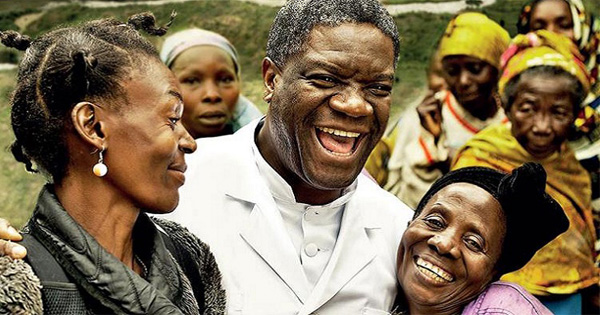Dr. Denis Mukwege: the man who repairs women victims of sexual violence
“Darkness can not chase darkness; only light can. Hate can not drive hatred; only love can.”
Quote from Martin Luther King.
In 2018, the obstetrician gynecologist and human rights activist, Dr. Demis Mukwege, wins the Nobel Peace Prize for her work with women victims of sexual violence in the DRC. This quote from Martin Luther-King sums up his fight perfectly.
The birth of a man with a big heart
Born on March 1, 1955 in Bukavu, Belgian Congo, Dr. Mukwege is a pastor’s son. He usually accompanies his father, a Pentecostal pastor, who regularly goes to the bedside of his sick parishioners to pray for them.
“Whenever there was a patient in a Protestant family, my father was solicited. He went to see the patient, prayed, took him to the hospital if he had to … And I accompanied him, “he explains.
During a visit from his father to pray for a child of 8 eight seriously ill. He laments the situation of this young child, who receives no medical treatment. His father explains that he is not a doctor, but a pastor. And at his level, he can only pray for this boy.
“I explained to my father that he would continue to pray, but that I would become a doctor, and that I would give injections to the sick …”
His vocation was born. The desire to save lives and change the world grew in him. After graduating from high school, he received his doctor’s degree in 1983. He moved to France to pursue a specialization in gynecology at the University of Angers and in 2015 became a doctor of medical sciences at the University of Brussels.
In 1989, he decided with his wife and three children to return home. He became medical director for the Lemera hospital in Zaire. In 1996, following the first war in Congo, his hospital was destroyed. Later, in 1999, he founded Panzi Hospital in Bukavu.
https://www.youtube.com/watch?v=kUks-m9ody4
Sexual violence: the sad reality of the country.
The First Congo War (November 1996 to May 17, 1997)
The Second Congo War (August 2, 1998 to June 30, 2003)
In the east of the country, in the provinces of North and South Kivu, many armed groups brutalize and oppress the local population because of the Coltan mines, which are used for the manufacture of mobile phones.
These armed, barbaric groups use rape as a weapon of war to drive the population out of these areas. This war has been going on for more than 20 years and Dr. Mukwegue is saddened and shocked by the horrors he is witnessing. He receives in his hospital many women, children and men victims of sexual violence, who have suffered genital mutilation.
“It’s our reality today in the DRC,” he says in front of the assembly. Babies, moms, grandmothers, and even boys are cruelly raped in public. They are sometimes inserted burning plastic or contentious objects in the genitals … The Congolese people are humiliated, abused for more than two decades. “
Through his foundation and the hospital, Dr. Mukwegue launches an alert on the living conditions of these women. He also decides to help them through surgery. He gives them medical, psychological and legal help. Since 1999, her hospital has treated more than 40,000 women victims of sexual violence.
“I never leave the operating theater happy – I have so many operations to do, so many women coming, still, still, and needing help – but I have to grab all the stands to tell the world what is happening in the Congo and try to make it responsible for what is now a weapon of war. “
Mutilated women who suffer in silence.
The doctor discovers mutilated women. Some were opened with machetes like cattle, vagina to breasts. Others were raped with Kalashnikovs. Their bodies were both raped and abused before being rejected. These dirty and dishonored women are subsequently rejected by their husbands and their respective families. They end up being collateral damage, forgotten victims rejected by all.
The case of Sarah, a young victim of violence by these armed groups has affected the doctor a lot. He explains :
“If people like Sarah do not give up, who are we to do it? “
Sarah’s story is overwhelming. The girl was taken to the forest and tied naked to a tree. Armed groups massacred his family. She suffered gang rapes every day. When she arrived at the hospital, she could no longer stand or hold her urine and stool. But his taste for life has helped him hold on.
“Every day that passed, it was she who encouraged the nursing staff not to lose hope. Every day, Sarah fought for her survival. Today, she is a beautiful woman, strong, smiling and charming. “
Today, she bought land and became independent. His fighting spirit and determination show that you can survive in the dark.
Attempt to assassinate Dr. Mukwegue.
Every day, he fights as best he can to repair the women who are victims of these attacks. But his work disturbs those who wish to create a climate of instability and fear in the region. He is the victim of an assassination attempt on October 25, 2012. He manages to escape, but the guardian of his house is found dead. He leaves Congo for a while and decides to go into exile in Belgium. Courageous, he decides to come back to finish the work he started. Many women in Kivu need him. He continues his fight in the hospital of Panzien permanently living with soldiers of the United Nations Mission in Congo (MONUSCO). In addition to his medical activity, he officiates as a pastor in a church of Bukavu in the Belgian Congo.
Honors and Awards
His courage and his fight are praised internationally. People are admiring this brave Dr. who repairs women the best he can.
2008: he was awarded the United Nations Human Rights Prize.
2009: he is decorated with the Legion of Honor by France.
2011: He wins King Baudouin’s prize for development in Africa.
2014: The Sakharov Prize for Freedom of Thought of the European Parliament
2018: Nobel Peace Prize for Dr. Mukwegue. He dedicates his prize to all the victims of sexual violence in the world.
Love and faith in the horror of war.
In addition to his medical activity, he officiates as a pastor in a church of Bukavu in the Belgian Congo. His faith, his love for God is what allows him to move montages. This allows him to cope with the pain and suffering of his wives. The man who repairs women continues to struggle against the darkness of the world around him. He risks his life from day to day for the sake of these women subscribers of all.
“Without faith, I do not see what I could have done. “
Dr. Denis Mukwege
What do you think?















